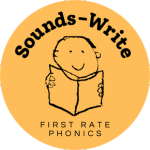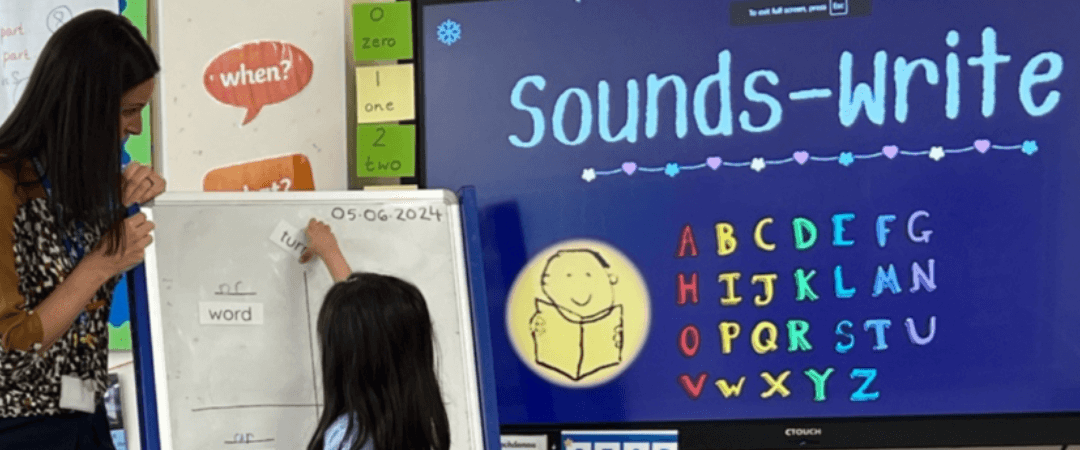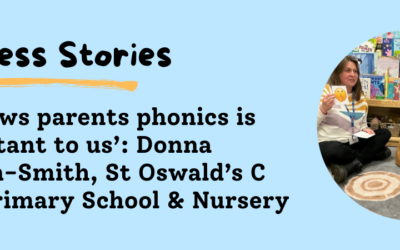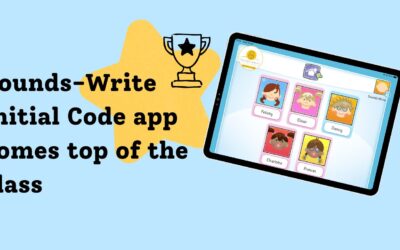We talked to Katherine Murphy, phonics lead at Twynyrodyn Community School, in Merthyr Tydfil, Wales, a school that took the decision to teach systematic synthetic phonics to improve reading outcomes for their students.
Why did you choose Sounds-Write?
Reading outcomes in the school were not where we wanted them to be. We looked at the research available and identified systematic synthetic phonics as the best way to teach early reading. We explored different validated programmes and arranged a meeting with a member of the Sounds-Write team. The professional development links to meaningful research that underpinned the programme, along with opportunities to speak with other schools already on the journey, made it clear that Sounds-Write was the best route for us.

The professional development links to meaningful research that underpinned the programme, along with opportunities to speak with other schools already on the journey
Katherine Murphy, phonics lead
When did you start implementing Sounds-Write and how did you do it?
All staff (teachers, teaching assistants and the senior leadership team) were trained during the summer term 2021 and we began implementing the programme in September 2021 to children in Reception to Year 4, with a focus on fidelity to the script. Learning walks, lesson observations and coaching session were used to ensure fidelity to the script. We’re currently training Key Stage Two staff, ready to implement in KS2 from September 2024.
What has been the reaction from children and parents?
Children enjoy the Sounds-Write sessions and are engaged throughout. This is evidenced by children role-playing Sounds-Write during enhanced provision. Parents have supported the implementation of Sounds-Write by attending parent workshops and reading decodable readers with children at home. Many have noted that their younger children, who have been taught Sounds-Write, are more confident readers than their older siblings.
What impact has Sounds-Write had on student progress?
The introduction of Sounds-Write is the change that has had the biggest impact on children’slearning. Children’s confidence and independence while reading and writing has grown dramatically.
In 2023, 89% of children were at or above average in the National Reading Tests. 67% of pupils had a spelling age at or above their chronological age. On average, pupils were 13 months ahead of their chronological age and made an average of 15 months progress between the Autumn and Summer terms.
We also use the Phonics Screening Check to monitor progress with Year 1. In 2021, before we started using Sounds-Write, only 18% of our Year 1 achieved the pass mark. By 2023, 74% of our Year 1 achieved the pass mark.
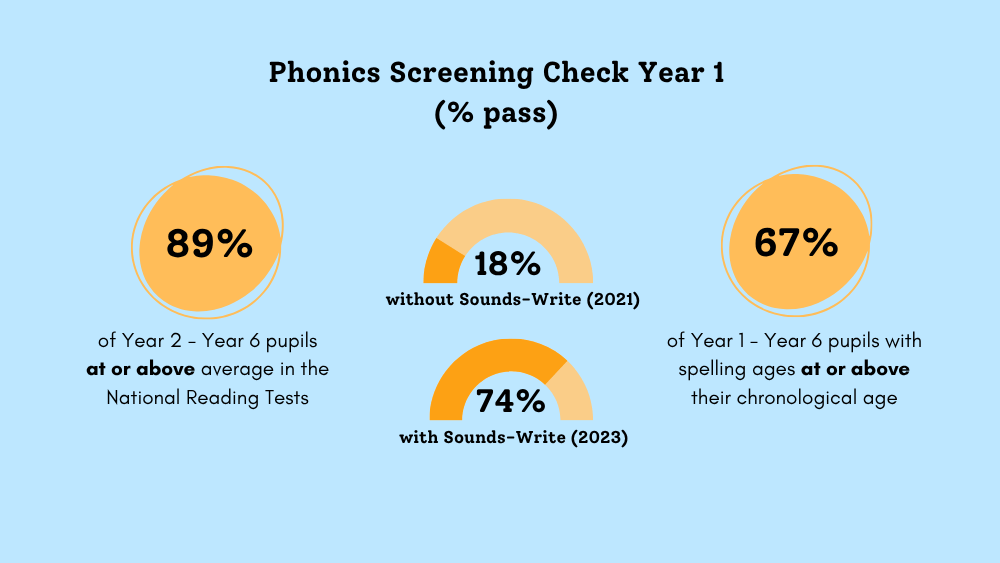
How does Sounds-Write compare to your previous phonics provision?
Sounds-Write has led to a consistent approach to the teaching of phonics at Twynyrodyn through the use of scripts and the repetitive nature of the lessons, which lowers the cognitive load for teachers and pupils. Along with the lesson scripts, Sounds-Write provides error correction scripts to follow, and these foster children’s independence as they provide just enough information so they can correct the mistakes themselves.

The professional development links to meaningful research that underpinned the programme, along with opportunities to speak with other schools already on the journey
Katherine Murphy, phonics lead
The biggest difference from previous programmes is that Sounds-Write begins with sounds in the language and moves from sounds to the written word. Previous programmes have focused on spellings rather than the phonemic nature of the alphabet code. Teaching Sounds-Write sessions as a whole class rather than the ability groupings we used in previous programmes ensures we are closing the gap rather than widening it.
The quality of training is fantastic. It has transformed our professional discussions and practice of teaching reading and spelling to our children.
You may also like
Phonics Screening Check – Tips for a Strong Start to the Academic Year (Australia)
Whilst the timing of this blog was prompted by the start of the new academic year in Australia, the guidance will be useful to teachers using a Phonics Screening Check anywhere around the world. In fact, we shared a VERY similar post back in September for the start of...
‘It shows parents phonics is important to us’: Donna Wilson-Smith, St Oswald’s C of E Primary School & Nursery
Donna Wilson-Smith, Headteacher at St Oswald’s Church of England Primary School and Nursery and a former Sounds-Write Literacy Specialist, shares with us how they have been using Sounds-Write in the nursery to get children ready to start their literacy journey.Tell us...
Sounds-Write Initial Code app comes top of the class
With more than 9,000 apps marketed as supporting early reading development, parents and educators find it almost impossible to choose truly effective apps for reading instruction. The authors of the study conclude that despite widespread use, most literacy apps do not...
Discover Sounds-Write
Book a free consultation to discuss your individual training needs.
